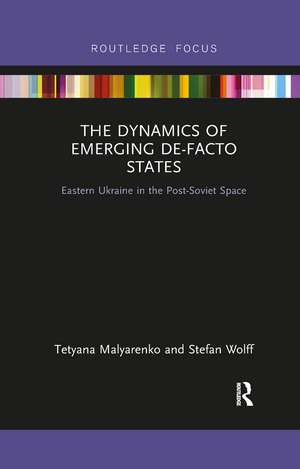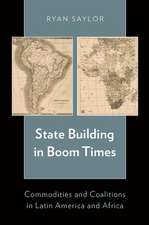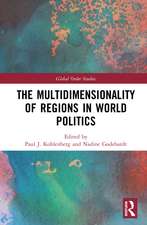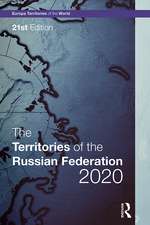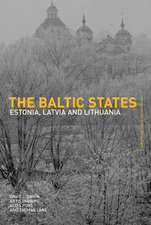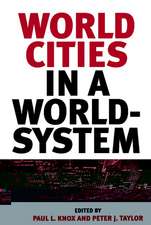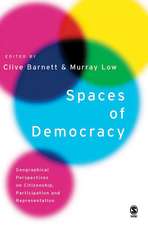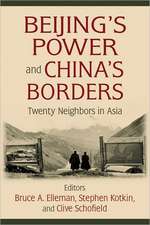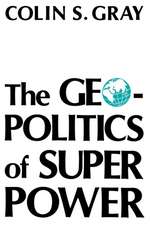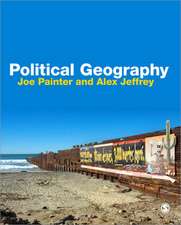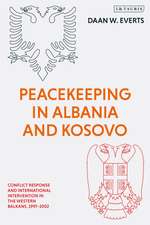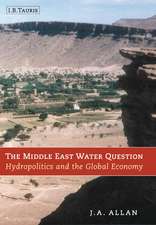The Dynamics of Emerging De-Facto States: Eastern Ukraine in the Post-Soviet Space
Autor Tetyana Malyarenko, Stefan Wolffen Limba Engleză Paperback – 30 iun 2021
The crisis evolved from peaceful protests to full-scale military conflict and to an unstable ceasefire frequently interrupted by, at times, intense clashes between government forces and separatist rebels. Tracing the emergence of two new de-facto state entities in the post-Soviet space—the self-declared Donetsk and Luhansk People’s Republics—from the chaos of the early days after Russia’s annexation of Crimea in Spring 2014 to the second Minsk Agreement in February 2015, and focusing on the actions of the immediate conflict parties and their external backers, the authors investigate the feasibility and viability of several prominent ‘scenarios’ for a possible future settlement of the conflict.
As an in-depth case study of the complex dynamics of the conflict at local, national, regional, and global levels of analysis, the book complements and advances existing scholarship on civil war and international crisis management and also provides insights for the policy community and the wider interested public.
| Toate formatele și edițiile | Preț | Express |
|---|---|---|
| Paperback (1) | 198.45 lei 43-57 zile | |
| Taylor & Francis – 30 iun 2021 | 198.45 lei 43-57 zile | |
| Hardback (1) | 453.68 lei 43-57 zile | |
| Taylor & Francis – 27 dec 2018 | 453.68 lei 43-57 zile |
Preț: 198.45 lei
Nou
Puncte Express: 298
Preț estimativ în valută:
37.99€ • 41.27$ • 31.93£
37.99€ • 41.27$ • 31.93£
Carte tipărită la comandă
Livrare economică 21 aprilie-05 mai
Preluare comenzi: 021 569.72.76
Specificații
ISBN-13: 9781032094076
ISBN-10: 1032094079
Pagini: 104
Dimensiuni: 138 x 216 x 6 mm
Greutate: 0.45 kg
Ediția:1
Editura: Taylor & Francis
Colecția Routledge
Locul publicării:Oxford, United Kingdom
ISBN-10: 1032094079
Pagini: 104
Dimensiuni: 138 x 216 x 6 mm
Greutate: 0.45 kg
Ediția:1
Editura: Taylor & Francis
Colecția Routledge
Locul publicării:Oxford, United Kingdom
Cuprins
1. Introduction 2. A blended conflict in an antagonistically penetrated region: a framework for understanding the conflict in eastern Ukraine 3. Origins and early developments of the conflict, November 2013—July 2014. 4. Identity and identity-building in Donbas before and after the beginning of the conflict 5. From nomadic to entrenching occupation: Russian-sponsored state-building in Donbas 6. From conflict management to conflict settlement: the interplay of domestic and external factors 7. Conclusion
Notă biografică
Tetyana Malyarenko is Professor of International Security and Jean Monnet Professor of European Security at the National University ‘Odesa Law Academy’, Ukraine. She is the founder and director of the Ukrainian Institute for Crisis Management and Conflict Resolution, and has held visiting positions at Johns Hopkins University, the Wilson Centre for International Scholars, the University of California, Berkeley, the University of Granada, the University of Tromso, and the University of Gothenburg. An expert on post-conflict and post-authoritarian transitions, she is the author of numerous books, book chapters, and journal articles in Ukrainian, English, and Russian. Malyarenko earned her Masters, Candidate of Science, and Doctor of Science Degrees from Donetsk State University of Management.
Stefan Wolff is Professor of International Security at the University of Birmingham, England, U, and an Associate Fellow at the Royal United Services Institute in London. An expert on international crisis management and post-conflict state-building, he has published over 80 journal articles and book chapters, as well as 17 books, including Ethnic Conflict: A Global Perspective (Oxford University Press, 2007), Conflict Management in Divided Societies: Theories and Practice (Routledge, 2011, with Christalla Yakinthou), and The European Union as a Conflict Manager (Routledge, 2012, with Richard G. Whitman). Bridging the gap between academia and policy-making, he frequently advises governments and international organisations and has been involved in various stages of peace negotiations, including in Africa, the Middle East, and the post-Soviet space. Wolff graduated from the University of Leipzig, and holds an M.Phil. from the University of Cambridge and a Ph.D. from the London School of Economics and Political Science.
Stefan Wolff is Professor of International Security at the University of Birmingham, England, U, and an Associate Fellow at the Royal United Services Institute in London. An expert on international crisis management and post-conflict state-building, he has published over 80 journal articles and book chapters, as well as 17 books, including Ethnic Conflict: A Global Perspective (Oxford University Press, 2007), Conflict Management in Divided Societies: Theories and Practice (Routledge, 2011, with Christalla Yakinthou), and The European Union as a Conflict Manager (Routledge, 2012, with Richard G. Whitman). Bridging the gap between academia and policy-making, he frequently advises governments and international organisations and has been involved in various stages of peace negotiations, including in Africa, the Middle East, and the post-Soviet space. Wolff graduated from the University of Leipzig, and holds an M.Phil. from the University of Cambridge and a Ph.D. from the London School of Economics and Political Science.
Descriere
What are the causes and consequences of the crisis in Ukraine, and what has been the nature of local, national, and external actors’ involvement in it? These are the questions that the authors examine in this comprehensive analysis of the situation in Ukraine.
